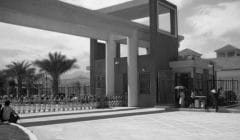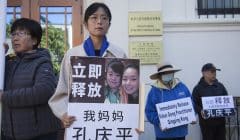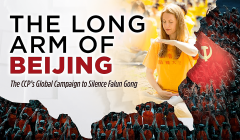New York Times: Beijing Journal; If It’s a Comic Book, Why Is Nobody Laughing?
By Seth Faison | Aug 17, 1999
For the ordinary Chinese citizen who may be tiring of the Government’s relentless crusade denouncing Falun Gong, the spiritual movement that was outlawed last month, there is now an easy-to-read version: the comic book.
Full of cartoons that try to ridicule Li Hongzhi, Falun Gong’s founder, the new comic books drip with so much political venom that they capture the labored nature of the campaign in a way that verges on parody. The comic books recently went on sale here for 75 cents each.
The anti-Falun Gong campaign, the largest and broadest political campaign in a decade, is both as thorough and as stilted as Government-orchestrated movements from decades past, when access to information was limited and ordinary people swallowed what they were told more easily.
If this year’s campaign is a demonstration of the durable power of Government propaganda that survives in China today, it also seems distinctly out of touch with an increasingly pluralistic society.
A central feature is a demonization of Mr. Li, who now lives in New York. A deafening barrage of broadcasts and articles in the state media each day portray Mr. Li as a charlatan and an evil genius, though not a very smart one.
The comic books distill the Government’s claims against Mr. Li into their simplest form. Even the title of the first such book, ”Li Hongzhi: The Man and His Evil Deeds,” carries the kind of political defamation that the Communist Party mastered in previous campaigns.
On the book’s opening page, a drawing of Mr. Li shows him pretending to be a holy figure, with a caption that reads, in part, ”His illegal doings seriously disrupted the normal order of society, causing chaos in people’s social and moral principles.”
You might think Mr. Li single-handedly brought China to the brink of social collapse. But it gets better.
The caption beneath another drawing reaches even further: ”Li Hongzhi spread Falun Gong’s malicious distortions, raising an apocalyptic view that created social terror.”
The look of these comic books is distinctly reminiscent of the cartoons that were drawn about the Gang of Four, the leftist radicals who were arrested after the death of Mao in 1976 and blamed for pushing China into chaos in the 1960’s and 70’s. Oddly, the characters in the new cartoons wear clothing styles that were popular 20 and 30 years ago.
”They look so strange,” said a Chinese businessman who expressed amazement at the old-fashioned nature of the anti-Falun Gong campaign. ”It’s as though we are reliving a bad dream.”
Nearly a month into the campaign, Chinese authorities are still running it full-blast.
Recent reports have ridiculed Mr. Li for stressing the merits of frugality and simple living to his followers while he bought a fancy house in Changchun, his hometown in northeastern China, though when shown on television it did not look more luxurious than an ordinarily comfortable two-bedroom apartment.
Yet some attacks have been so vicious and loaded with extreme political comparisons that they seem to veer close to farce. A recent issue of Southern Weekend, a Guangzhou-based newspaper, likened Mr. Li to a ”despotic tyrant like Hitler,” and then indulged in parallels to favorite Communist Party villains of the 1960’s.
”We are familiar with the cult of personality created by Li Hongzhi and Falun Gong and Li’s claim to be a savior,” the newspaper said. ”This is the political legacy of the Cultural Revolution, as ‘the savior’ kind of idolatry fabricated by Lin Biao and Jiang Qing and their ilk are deep-rooted in the hearts of the Chinese people.”
Mr. Lin was chosen as Mao’s deputy, but died mysteriously in what the authorities said was a plane crash that followed a failed plot to assassinate Mao. Ms. Jiang was Mao’s wife. After his death in 1976, she was arrested as a member of the Gang of Four and imprisoned until 1991, when she hanged herself.
The comic books, like numerous accounts in newspaper articles, seem to revel in ridiculing Mr. Li for changing his birthday from July 7 to May 13, apparently to suggest to followers that he was born on the same day as the Buddha.
The comic books also make much of Mr. Li’s story that he was in Australia on April 25 this year, and knew nothing about the stunning demonstration by Falun Gong followers when they surrounded Zhongnanhai, the exclusive compound in central Beijing where China’s leaders live and work.
As the authorities proved by digging up Beijing airport records of Mr. Li’s entry on April 22 and exit on April 24, he was actually in Beijing just before the demonstration. Mr. Li has said since that he flew to Beijing to change planes, and that he never spoke to anyone in Falun Gong while he was in China.
To many Falun Gong followers, the official attempts to defame Mr. Li are so patently slanted as to be absurd.
”All those things they are saying on TV are untrue,” said a real-estate salesman surnamed Gao, who approached a reporter to insist that Falun Gong is being misrepresented in official accounts. ”They take the worst things that happened to anyone and blame it all on Falun Gong.”
The original article is available here: http://query.nytimes.com/gst/fullpage.html?res=9405EFD71139F934A2575BC0A96F958260










